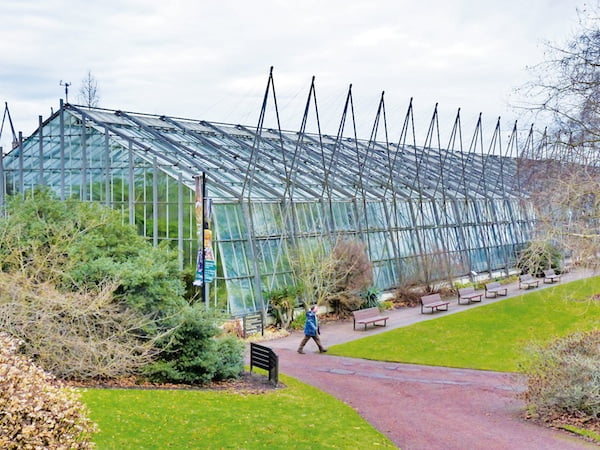Edinburgh’s Post-War Architecture to be celebrated in new book
 The Forth Road Bridge, the Scottish Widows Head Office Building and the Royal Botanic Gardens Greenhouse are all to be featured in a new book celebrating Edinburgh’s post-war architecture.
The Forth Road Bridge, the Scottish Widows Head Office Building and the Royal Botanic Gardens Greenhouse are all to be featured in a new book celebrating Edinburgh’s post-war architecture.
The publication, which is a joint partnership between Edinburgh City Council and Historic Scotland, is the first of its kind for a Scottish city and looks at Edinburgh’s rich post-war heritage. The city is home to a quarter of the total post-war listed buildings in Scotland.
The book covers a wide range of examples of how the city developed in the post-war period. This ranges from the Forth Road Bridge, which was the first cable spun suspension bridge to challenge the American designs of the period, through to BHS on Princes Street, which with its clean lines and rectangular floor plan marked a complete departure for shoppers in 1960’s Scotland.
The book also features all seven of Basil Spence’s listed buildings in the city. Spence, who was one of the most prolific designers of his generation, left a rich legacy which is most keenly seen in his innovative work designing Scottish Widows Head Office. The building is best known for its cutting edge hexagonal prism roof which was designed to mirror the imposing backdrop of the Salisbury Crags.
The publication also includes some lesser known properties such as the seemingly humble Her Majesty’s Stationery Office by Stewart Sim, in Sighthill Industrial Estate. The building is in fact the first multi-storey building in Europe to be built using pre-stressed concrete which became the prominent material for floors in high rise buildings until this day, demonstrating the continuation of Scotland’s reputation for innovation in building. This innovation was also seen in other areas such as glasswork, with the Royal Botanic Greenhouse’s careful construction heralded at the time as the most important glasshouse construction since Kew Garden’s Palm House.
Deborah Mays, Director of Policy and Outreach for Historic Scotland said:-
“Post-war buildings can provoke a number of different reactions, but historic buildings need to reflect all aspects of life and these buildings are a key embodiment of our recent social and economic past.
“For example, when the Forth Road Bridge opened in 1964 it was hailed as one of the finest examples of engineering in the world – so much so that visiting dignitaries and celebrities would come to have their photo taken next to this extraordinary landmark.
“The Commonwealth Pool, which is currently undergoing refurbishment, was groundbreaking in its late modernist design and won several awards and is an interesting example of sporting heritage as we look ahead to the potential legacy of 2014.
“Meanwhile the three telecommunications buildings listed in the city – the only buildings of their kind to currently be listed in Scotland- at Fountainbridge, Pitsligo Road and London Road tell a powerful story about the economic make-up of Edinburgh at this time and particularly the development of women’s employment opportunities.
“We hope that this book will act as an introduction to the post-war period for a range of audiences and will provide the opportunity to stimulate debate about this evolving sector.”
Councillor Jim Lowrie, Head of The City of Edinburgh Council’s planning committee, said:-
“The City of Edinburgh Council is very pleased to be the first local authority in Scotland to work with Historic Scotland on a publication of this kind which celebrates the great variety and quality of Edinburgh’s modern buildings.
“The buildings currently listed in Edinburgh tell a number of stories about our recent past, and we hope that this publication will engage all of those with an interest, whether owners or developers, architects, planners, heritage professionals and the public at large.”
The book is available to download from Historic Scotland’s website (www.historic-scotland.gov.uk/historicandlistedbuildingspublications) or can be requested via the agency’s Listing Team support office on 0131 668 8701/ 8705.
Thank you to Historic Scotland for providing us with a photo of the glasshouse…..